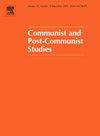逃离苏维埃人的阴影
IF 1.3
4区 社会学
Q3 INTERNATIONAL RELATIONS
引用次数: 1
摘要
人们经常断言,以斯大林日益“受欢迎”为标志的苏维埃人的价值观和态度,在当代俄罗斯仍然存在,成为社会和政治发展的负面因素。这篇文章批评了对斯大林的态度反映了未改革的苏联价值观,并解释了俄罗斯的专制倒退和现代化失败的论点。我们对这种遗产论的批判有三个部分。首先,在考察了列瓦达中心方法的问题要素之后,我们为理解斯大林和镇压的定量数据提供了另一种解释。其次,我们研究了采访数据,结果显示,对于那些持亲斯大林立场的人来说,“捍卫斯大林”只是一个更广泛世界观的一小部分,而这个世界观显然不是“苏联遗产”的一部分。第三,我们考虑了trudnaia-pamiat项目的调查数据,发现人们普遍不愿讨论斯大林主义的过去,我们认为这代表了一种对立的立场。因此,我们在一个复杂的社会和文化转型的更广泛背景下解释对斯大林的态度,在这个背景下,20世纪90年代的失态已经被朝着更积极的身份结构的动态所取代。一方面,这种对抗性的记忆模式在国家主义和爱国主义话语中是可见的,这些话语并没有严肃地围绕斯大林展开,而是抵制对他的强烈批评。另一方面,我们发现在俄罗斯有更多的人回避斯大林问题,采取一种对抗的模式,通过“去政治化”的历史版本来避免冲突。本文章由计算机程序翻译,如有差异,请以英文原文为准。
Escaping the Long Shadow of Homo Sovieticus
It is often asserted that the values and attitudes of Homo Sovieticus, marked in the rising “popularity” of Stalin, live on in contemporary Russia, acting as a negative factor in social and political development. This article critiques the argument that attitudes to Stalin reflect unreformed Soviet values and explain Russia’s authoritarian regression and failed modernization. Our critique of this legacy argument has three parts. First, after examining the problematic elements of the Levada Center approach, we offer alternative explanations for understanding quantitative data on Stalin and the repressions. Second, we examine interview data showing that, for those with a pro-Stalin position, “defending Stalin” is only a small part of a broader worldview that is not obviously part of a “Soviet legacy.” Third, we consider survey data from the trudnaia-pamiat’ project and find common reluctance to discuss much of the Stalinist past, which we argue represents an agonistic stance. Thus, we interpret attitudes to Stalin within a broader context of complex social and cultural transformation where the anomie of the 1990s has been replaced with dynamics toward a more positive identity construct. On the one hand, the antagonistic mode of memory is visible in statist and patriotic discourses, which do not seriously revolve around Stalin but do resist strong criticism of him. On the other hand, we find many more in Russia avoid the Stalin question and adopt an agonistic mode, avoiding conflict through a “de-politicized” version of history.
求助全文
通过发布文献求助,成功后即可免费获取论文全文。
去求助
来源期刊

Communist and Post-Communist Studies
Multiple-
CiteScore
1.90
自引率
0.00%
发文量
23
期刊介绍:
Communist and Post-Communist Studies is an international journal covering all communist and post-communist states and communist movements, including both their domestic policies and their international relations. It is focused on the analysis of historical as well as current developments in the communist and post-communist world, including ideology, economy and society. It also aims to provide comparative foci on a given subject by inviting comments of a comparative character from scholars specializing in the same subject matter but in different countries.
 求助内容:
求助内容: 应助结果提醒方式:
应助结果提醒方式:


